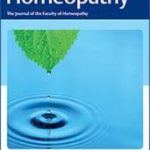A. Steinsbekk, T.V.L. Nilsen and M.B. Rise
Characteristics of visitors to homeopaths in a total adult population study in Norway (HUNT 2)
Homeopathy, 2008, 97 (4), 178-184

Objectives - To study the characteristics of people visiting homeopaths in a total adult population in Norway.Methods - Data from a total population cross sectional health survey conducted in 19951997 in Central Norway (HUNT 2) with 65,495 participants. Variables included in the analysis were age, marital status, education, being a social welfare recipient, lifestyle (daily smoker), Hospital Anxiety and Depression Scale (HADS-T), global health perception, self-reported health complaints and a variety of diseases. Significance level p < 0.01.Results - 40,027 persons over 20 years answered the question on visits to a homeopath. 4.3% had consulted a homeopath during the last 12 months. The likelihood of a person consulting a homeopath was most strongly associated with being female (adjusted odds ratio 2.3, 95% confidence interval 2.12.6) and having a lower perceived global health (increasing from 1.5, 1.21.8 for good global health to 2.9, 1.94.3 for poor global health). There was a weaker but significant association between increased likelihood of visiting a homeopath and being 3039 years (1.3, 1.11.4), having a HADS-T score between 1014 (1.3, 1.11.6) and 1519 (1.6, 1.32.0), having a health complaint the last year (1.5, 1.21.7), hay fever (1.7, 1.52.0), consulted for a psychiatric complaint (1.5, 1.31.8) and another chronic disease than the ones asked about in this study (1.3, 1.11.6). Being a smoker was significantly associated with decreased likelihood of consulting a homeopath (0.7, 0.60.7). There was also a trend for increased likelihood of visits to homeopaths (p < 0.1) for those 60 years and over, social welfare recipients, having a chronic complaint and HADS-T score of 20 or higher, and decreased likelihood for widow(er)s.Conclusions and proposals - Being female and having a lower perceived global health were the variables most strongly associated with visits to a homeopath. More studies on visits to homeopaths from other populations (countries, children and adolescent) are needed.





